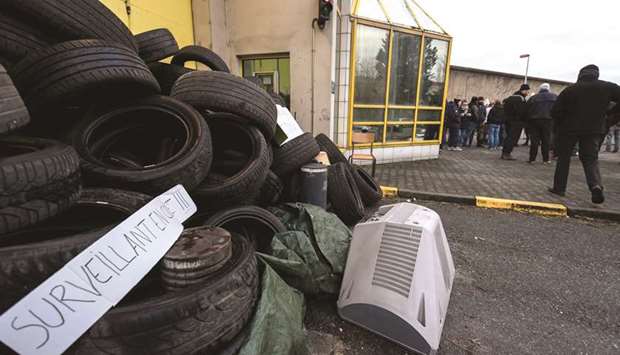At Fresnes prison near Paris, one of the country’s biggest, unions at a staff meeting on Monday pushed for an all-out strike in protest over a wave of attacks on guards by violent convicts.
However, the guards are divided on the wisdom of escalating tensions at the dangerously-overcrowded facility with 2,800 inmates crammed into cells designed to hold 1,400.
Under French law, prison officers are banned from striking.
“To be clear, they will suspend you and threaten to fire you,” Frederic Godet, the local representative of the Ufap-Unsa union, told the meeting.
Conditions in French prisons have long been a source of anger among prisoners and guards and an embarrassment for the state, with President Emmanuel Macron describing them as “disgraceful”.
An official report on conditions in Fresnes in 2016 found it to be infested with rats, with prisoners sleeping three to a 10sq m (100sq foot) cell, and said surveillance was “illusory”.
Adding to the prison guards’ grievances is the radicalisation of inmates who come under the sway of jailed religious extremists.
French prisons have developed a reputation for being hotbeds of religious extremism that have turned out some of the militants behind a series of bloody attacks in recent years.
The worst dispute in the penitentiary service in 25 years began after a convicted Al Qaeda extremist attacked guards in a high-security facility in the north of the country on January 11 with a razor blade and scissors, injuring three of them.
Guards complain that the conditions in which violent and radicalised inmates are held are too lenient.
Last week, three inmates at a prison on the southern island of Corsica, one of whom is under surveillance for religious radicalisation, attacked two guards with a knife, wounding one of them seriously.
At the other end of the country, in the northern Calais region, a male and a female guard were treated in hospital for injuries after being attacked by a prisoner with an iron table leg.
On Monday, unions in Fresnes – one of 50 prisons nationwide where staff are refusing to work or have been shut out by picketers – voted to keep blocking the prison gates.
“The minimum wage to risk your life? It’s not enough, especially with the new threats posed by radicalised inmates,” one guard with eight years of service argued.
Nine days of protests, affecting more than 100 out of France’s 188 prisons to varying degrees, have taken a toll on prisoners’ morale, sharpening tensions between them and their jailers.
“We’re being held hostage,” one frustrated convict told AFP by telephone from Fleury-Merogis prison, France’s largest, where police used tear gas and baton charges to disperse picketers last week.
“If this goes on, things are going to get out of hand,” said the man, who did not wish to be identified, complaining that family visits were delayed, sports and other activities cut back and that his bin was “starting to smell” as rubbish piled up.
Yesterday the government attempted to defuse the tensions by saying that it is ready to consider pay increases for the first time since the stand-off began.
It has also offered to create 1,100 guard jobs over four years and step up security around the most dangerous inmates.
But within an hour of the announcement, talks between unions and Justice Minister Nicole Belloubet had broken down.
Jean-Francois Forget, leader of the Ufap-Unsa union, the biggest among prison guards, said she had not agreed to “one-tenth” of their demands.
The guards are demanding a 20% increase to their starting monthly salary of around €1,500 ($1,830) before tax as well as the creation of 1,500-3,600 new guard positions and tighter surveillance of violent criminals.
To press their demands, they have brandished the threat of “laying down the keys”, or all-out strikes that would see prisoners confined to their cells.
At jails in Lille in the north, Metz in the east and the southwestern city of Bayonne, police have already had to step in to feed prisoners in the guards’ absence.
But many guards are divided on the merits of all-out confrontation, fearing the wrath of the state if they flout the strike ban.

